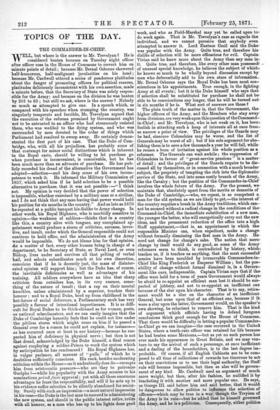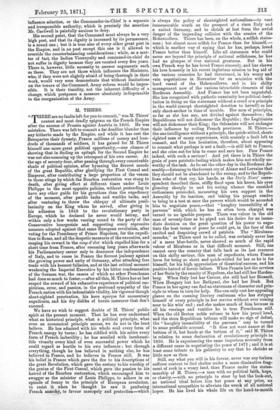TOPICS OF THE DAY.
THE COMMANDER-IN-CHIEF.
WELL, but where is the answer to Mr. Trevelyan ? He is considered beaten because on Tuesday night officer after officer rose in the House of Commons to correct him on minute points of detail ; because Mr. Bernal Osborne showered half-humorous, half-malignant jocularities on his head ; because Mr. Cardwell uttered a series of ponderous platitudes about the danger of promoting officers for political reasons, platitudes deliciously inconsistent with his own assertion, made a minute before, that the Secretary of State was solely respon- sible for the Army; and because on the division he was beaten by 201 to 83 ; but still we ask, where is the answer Nobody so much as attempted to give one. In a speech which, as compared with his speeches when stumping the country, was singularly temperate and forcible, Mr. Trevelyan argued that the execution of the reforms promised by Government ought not to be entrusted to an officer who had strenuously resisted them, who was wedded to the dying system, and who was surrounded by men devoted to the order of things which Parliament had resolved to sweep away. He certainly demon- strated the first part of his case. That the Duke of Cam- bridge, who, with all his prejudices, has probably some of that contempt for minor social distinctions which is inherent in the Royal caste, should be willing to let purchase go when purchase is inconvenient, is conceivable, but he has been much more than an advocate of purchase. He has pub- licly recorded his dread of the alternative the Government has adopted—selection—and his deep sense of his own incom- petence to work it. He informed the Military Commission of 1857, which asked him if he held selection to be a possible alternative to purchase, that it was not possible :—" I think not. My opinion is very decided that the power of selection is impossible, whether exercised by a military man or a civilian, and I do not think that any man having that power would hold his position for six months in the country." And so late as 1870 he repeated at a public banquet his dislike to Army change. In other words, his Royal Highness, who is morbidly sensitive to opinion—the weakness of soldiers—thinks that in a country like this, a country alive with tongues, any unexplained ap- pointment would produce a storm of criticism, sarcasm, invec- tive, and insult, under which the General responsible could not continue to hold office, and the administration of the Army would be impossible. We do not blame him for that opinion. As a matter of fact, every other human being in charge of a department, be he Secretary of State, or Naval Lord, or even Bishop, lives under and survives all that pelting of verbal hail, and selects subordinates much at his own discretion, conscious that if he is decently just, the mass of disinter- ested opinion will support him ; but the Duke has, of course, the inevitable deficiencies as well as advantages of his training. All soldiers everywhere have an idea that sharp criticism from outsiders has, in its very essence, some- thing of the nature of insult ; that a rap on their mental knuckles, unless administered by a superior, touches their honour ; and to a Royal Duke, bred up from childhood in the hot-house of social deference, a Parliamentary snub has very possibly a flavour of intentional impertinence. It is as diffi- cult for Royal Dukes to be thick-skinned as for women, poets, or national schoolmasters, and we can easily imagine that the Duke of Cambridge honestly feels that he could not live under the pitiless storm which might come on him if he passed a General over for a reason he could not explain, for instance— as has occurred once at least in our history—because he sus- pected him of deficiency in physical nerve ; but then is not that dread, acknowledged by the Duke himself, a final reason against employing a soldier-Prince to work the system which by anticipation he has condemned ? His Royal Highness has, in vulgar parlance, all manner of "pulls,' of which he is doubtless sufficiently conscious. His rank, besides moderating criticism within the House—as it undoubtedly does do—exempts him from aristocratic pressure—who are they to patronize Guelphs ?—while his popularity with the Army secures to his nominations prime! facie approval ; yet with all these enormous advantages he fears the responsibility, and will if he acts up to his evidence suffer selection to be silently abandoned for senior- ity. Surely with such an impression—a most natural impression in his case—the Duke is the last man to succeed in administering the new system, and should in the public interest retire, retire with all honour, as a man who has up to his lights done good work, and who as Field-Marshal may yet be called upon toy do work again. That is Mr. Trevelyan's case as regards the individual, and we cannot perceive that anybody even,
attempted to answer it. Lord Eustace Cecil said the Duke- was popular with the Army. Quite true, and therefore his" dislikeof selection will be more efficacious for evil. Captain. Vivian said he knew more about the Army than any man in+ it. Quite true, and therefore, like every other man possessecb of unusual special knowledge, he believes the subject of whichi he knows so much to be wholly beyond discussion except by men who deferentially add to his own store of information.. Mr. Bernal Osborne says the Royal Duke has been most con- scientious in his appointments. True enough, in the fighting: Army at all events ; but it is the Duke himself who says that if selection shall be substituted for purchase he shall not be- able to be conscientious any longer, that he will be turned out in six months if he is. What sort of answers are those
The plain truth of the matter is, that the Government, the- higher officers of the Army, and the Members who stay away- from divisions, are very weak upon this question of the Command- in-Chief ; and Mr. Trevelyan, who is not weak on it, has been. foolish in attacking such a heap of interests all at once from. so narrow a point of view. The privileges of the Guards may be bad, sinecure Colonelcies may be worse, and the list of Generals may be worst of all ; but if his sole argument for abo- lishing them is to save a few thousands a year he will fail, while• he rouses a buzz of irritation against his whole position as a reformer. The Generals can wait awhile ; the suppression of " Colonelcies in favour of "great-service pensions " is a matter- of detail ; and the privileges of the Guards require to be dis- cussed all by themselves, or in connection with a much broader- subject, the propriety of tempting the rich into the diplomatic- service of the State, and into some costly branch of the Army, like the Cavalry ; but the position of the Commander-in-Chief involves the whole future of the Army. For the present, we- maintain that, absolutely apart from the merits or demerits of" the Duke of Cambridge,—who, we repeat, is as competent a man for the old system as we are likely to get, —the interest of- the country requires a break in the Army traditions, which can- not be secured without a radical change in the conditions of the- Command-in-Chief, the immediate substitution of a new man, the younger the better, who will energetically carry out the new ideas, and the permanent reduction of the office into a high_ Staff appointment, —that is, an appointment in which the" responsible Minister can, when expedient, make a change- without formally dismissing the first man in the Army. He- need not change for change's sake. The notion that mere- change by itself would do any good, as some of the Army- reformers seem to think, is contradicted by history, which+ teaches us, if it teaches us anything, that the most successful' armies have been moulded by irremovable Commanders-in- Chief like King Frederick or Emperor William ; but the pos- sibility of change without formal dismissal is, in a Govern- ment like ours, indispensable. Captain Vivian says that if the office were held for a term of years Government would always; be afraid to re-appoint an efficient man lest it should be sus- pected of jobbery, and not to re-appoint an inefficient one because of the slur upon his character. That is to say, retire- ment would be a slur on the character of an inefficient. General, but none upon that of an efficient one, because if it. were a slur upon the latter, Government would, on the speaker's, own showing, be reluctant to remove him. That is the kind of argument which officials having to defend foregone conclusions think good enough for the House of Commons.. That there would be difficulty in letting a popular Commander- in-Chief go we can imagine—the case occurred in the United States, where a tenth-rate officer was retained for life because he had beaten some Mexicans,—but as yet no such person has ever made his appearance in Great Britain, and we may ven- ture to say the arrival of such a personage, at once inefficient• and a darling of the householders, is to the last degree im- probable. Of course, if all English Cabinets are to be com- posed to all time of collections of cowards too timorous to act on their convictions or to use their legal authority, the Staff: rule will become impossible, but then so also will be govern ment of any kind. Mr. Cardwell used an argument of much more weight, but then, after his fashion, he nullified it by bracketing it with another and more popular one. He says, as George III. said before him and said better, that it would be dangerous to allow politics to influence the selection of' officers—which may be true in a way, though the Toryism of the Army is its ruin—but he added that he himself governed the Army, and he is a politician. Consequently, either politica
influence selection, or the Commander-in-Chief is a separate and irresponsible authority, which is precisely the assertion Mr. Cardwell is painfully anxious to deny. His second point, that the Command must always be a very high post, and that its dignity is increased by its permanence, is a sound one ; but it is true also of every other great post in the Empire, and in no post except this one is it allowed to override the counterbalancing considerations ; while, as a mat- ter of fact, the Indian Viceroyalty and command-in-chief do not suffer in dignity because they are vacated every five years. There is, however, little necessity to answer arguments such as these. They are not those which influence the Ministers, who, if they were not slightly afraid of being thorough in their work, would very soon demonstrate that without limitations on the tenure of the Command, Army reform would be impos- sible. It is their timidity, not the inherent difficulty of a change, which postpones a measure absolutely indispensable to the reorganization of the Army.



































 Previous page
Previous page